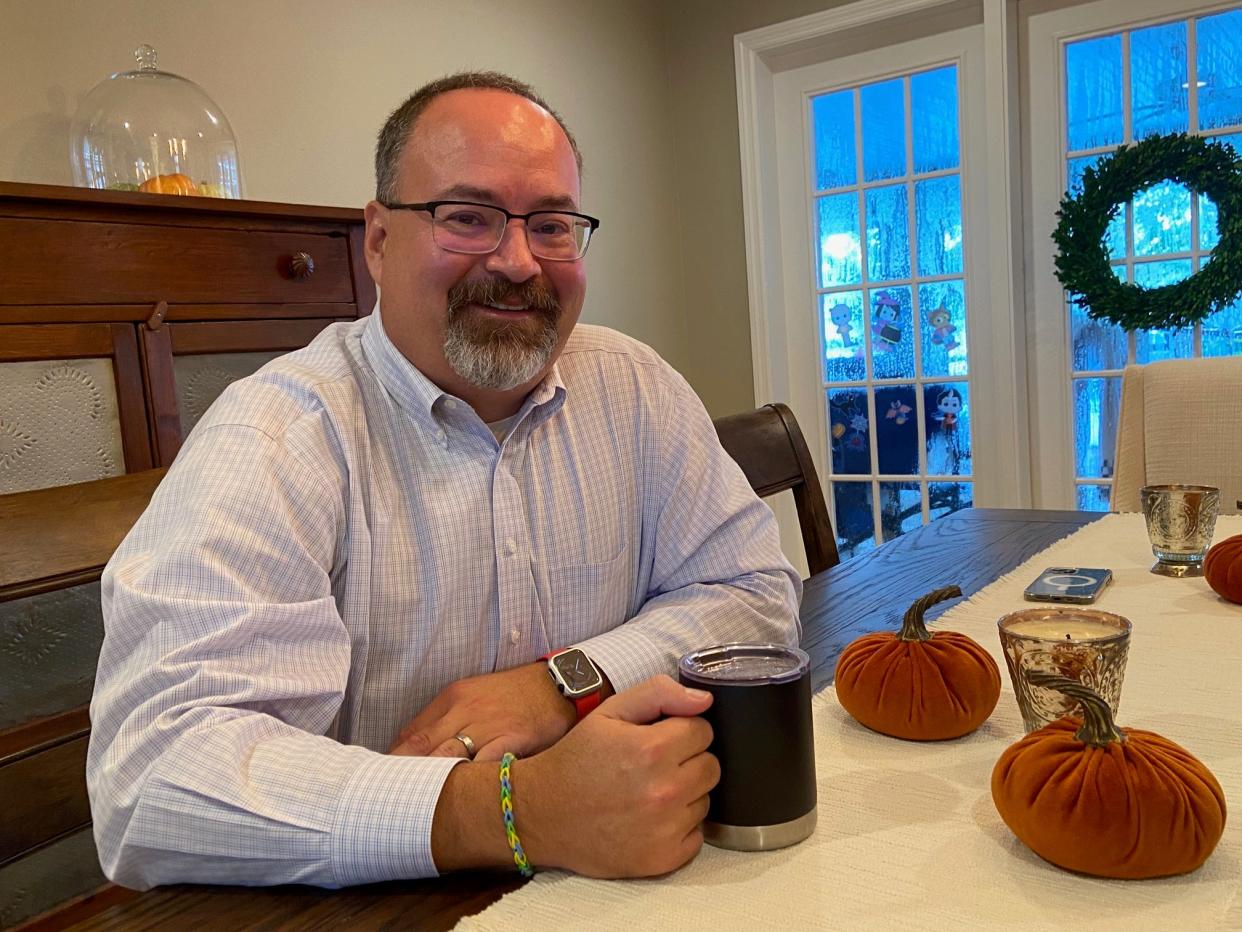'My gut kept telling me': Lakeland man urges young men to screen for prostate cancer

Chip Nuttall isn’t an excessive worrier, but he listens to his gut.
Ten years ago, when he was 40, it told him to start getting screened with the PSA (prostate-specific antigen) blood test.
That’s 10 years earlier than the typically recommended PSA-test starting time for men considered at average risk of prostate cancer.
It’s five years earlier than the recommended age of 45 for men at high risk of prostate cancer; a group including Black men and men with a first-degree relative, like a father, who got prostate cancer by age 65.
Nuttall’s father had been diagnosed at age 65.
Guidelines from the American Cancer Society and insurance companies said Nuttall didn’t need PSA screening in his early 40s. Insurance wasn’t going to pay the extra cost for him to get a PSA test.
Nuttall had been married 10 years then to his wife, Alice, and they were having their first child. He had financial incentives to forget about the extra $100 or so a PSA might cost him.
“My gut kept telling me to do it,” said Nuttall, a Lakeland resident then living in Nashville.
He paid out of his own pocket.
The PSA score came in at 0.88, well below the level that would have set off alarms then. Don’t worry about it for a couple years, he was told.
Nuttall, vice president of strategic initiatives for Genesco Inc., likes data. He kept paying for PSA tests until insurance would cover it.
He watched his numbers go up steadily each year: 1.32 in 2015, 1.66 in 2016, 2.44 in in 2017, 3.14 in 2018, 3.26 in 2019.
Even in the midst of those increases, Nuttall said, “I kept getting these little needles. People saying ‘you don’t need to worry about this yet.’”
In October 2018, he and his wife, now parents of two sons, moved to Lakeland. With the COVID scare, he skipped the PSA test in 2020.
By 2021, his PSA was at 3.4.
“It’s higher,” Nuttall recalls telling himself. ”It’s slowed down a little bit, but I’m still in the normal range.”
Was he really?
Some doctors use a PSA level of 4 or higher when deciding if a man needs further testing. Others recommend starting at a lower level, such as 2.5 or 3, according to the American Cancer Society.
Some call a PSA score greater than 2.5 abnormal for men in their 40s and 50s, although conditions other than cancer, like a urinary tract infection, can be the cause.
For men who get the PSA blood test, the American Cancer Society says retesting may be needed only every two years if the PSA comes in at a level less than 2.5 and cancer isn’t found.
Rescreening should be done yearly if the PSA is 2.5 or higher, but cancer isn’t found, the society says.
The Nuttall family’s move to Lakeland linked Nuttall with a new doctor who reviewed his carefully recorded PSA data.
Dr. Alexandra Von Lindeman, his primary care doctor with Lakeland Regional Health, said he should see a specialist about his steadily rising PSA results.
What persuaded him, he said, was when she said, “If it were my husband, I’d want him to see a urologist.”
He met with a urologist, who ordered a biopsy. The biopsy disclosed prostate cancer.
“If she’d mentioned biopsy to me, I’m not sure I would have gone,” Nuttall admitted, despite knowing what prostate cancer could do.
He credits the primary care doctor and subsequent specialists with saving his life. The experience made him an advocate for screening.
“Since I initially began telling my story a couple of years ago, I’ve encouraged family, friends, even complete strangers to have their PSA checked,” he said in a Facebook post in September (Prostate Cancer Awareness Month).
“Men, have your PSA checked. This one is beatable. It doesn’t have to kill you, but you need to get ahead of it.”
To young men like him, likely to worry about the impact of treatment on their continence and sexual ability, he’s blunt:
“Have your doctor pull an extra tube of blood. Pay for it if you have to. You’ll be glad you had the data.”
PSA and biopsy results are factors used in determining the clinical stage and severity of each prostate cancer.
“When men are identified at an earlier age, we have to determine what is the significance of their prostate cancer,” said Dr. Graham Greene, a urologic oncologist on Nuttall’s cancer-care team.
Younger prostate-cancer patients aren’t automatically at higher risk of having more aggressive tumors, Greene said.

They do, however, have more years on average than older men to worry about the likelihood of it spreading.
“Significant prostate cancers can be identified at less than the normal PSA level, which most people think is 4,” said Greene, medical director of surgical and specialty practices for LRH.
Greene encouraged men to get PSA screening along with a full check-up with their primary care doctor that would include exams to detect high cholesterol, high blood pressure and other health issues.
Primary care doctors, he said, should monitor changes in patients’ PSA results, and decide, as Von Lindeman did, “what’s your index of suspicion” in advising additional testing.
Nuttall’s prostate cancer was considered significant enough that he faced a decision that men in their 40s don’t expect:
Radiation or prostatectomy, surgery to remove the prostate gland. Because of nerve-sparing radical prostatectomy techniques, many men recover their erectile function after surgery.
His father, Clifford Nuttall III, had opted for radiation. He celebrated his 75th birthday and 10-year survivorship this fall.
His father-in-law, Dick Johnson, chose surgery. Now 77, he’s a 17-year survivor who was diagnosed at age 60.
Talking with those “two powerful men” gave him personal knowledge to supplement the literature he read, Nuttall said.
“Watchful waiting” or ongoing monitoring, often recommended for older men whose cancer is small and slow growing, is less likely to be viewed as a viable option for young men.
Nuttall chose surgery, which led the urologist who arranged his biopsy to refer him to Greene. He had the surgery on Dec. 27, 2021.
“The thing I came back to is ‘I don’t want this in my body anymore,’” he said.
The surgery went well and, coming up on its two-year anniversary, he said he’s at greater than 95% overall recovery.
“In your 40s, you can expect to recover from a lot of it,” he said.
“It just takes time.”
Robin Williams Adams can be reached at robinwadams99@yahoo.com.
This article originally appeared on The Ledger: Lakeland man who caught prostate cancer in his 40s touts early testing

